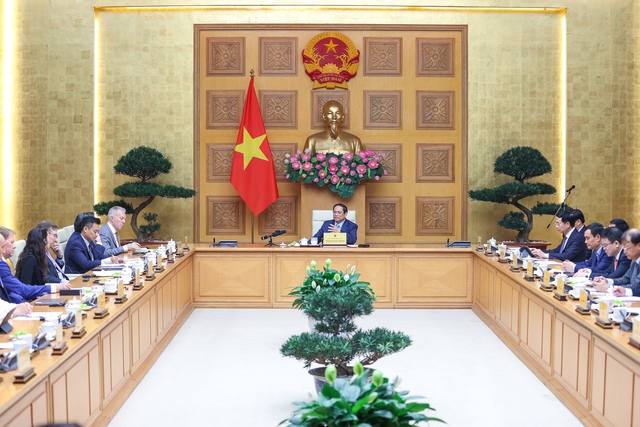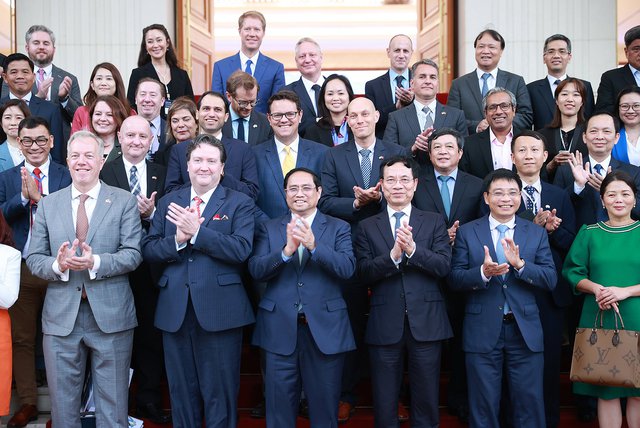Vietnam continues to push for stronger ties with US: PM
Vietnam considers the US as one of its most important partners and welcomes the US to support a strong, independent, and prosperous Vietnam.
Vietnam aims to enhance the Comprehensive Partnership with the US, focusing on mutually beneficial outcomes that generate employment opportunities and growth for both nations.
| Overview of the meeting. Photos: Nhat Bac |
“Such an effort would contribute to supporting global and regional stability, cooperation, and development while promoting peace and harmony.”
Prime Minister Pham Minh Chinh stressed the remarks during a meeting with a delegation of the US-ASEAN Business Council (USABC) today [March 22].
At the meeting, Chinh welcomed a delegation of over 50 large US enterprises to visit and work in Vietnam, coinciding with the 10th anniversary of the Vietnam-US Comprehensive Partnership (2013-2023).
The Prime Minister expressed gratitude to the US Government and businesses for their support in providing vaccines and medical equipment to Vietnam for Covid-19 prevention and control. He also commended the USABC and its member enterprises for their practical and effective contributions to Vietnam's economic development and bilateral relations.
The Prime Minister was pleased with the robust growth of the Vietnam-US bilateral relationship in recent years, particularly in the economic and trade sectors. Since the establishment of diplomatic relations almost 30 years ago in 1995, and the Comprehensive Partnership 10 years ago in July 2013, both countries have strengthened their ties in various fields such as economy, trade, investment, culture, society, science, technology, education, training, and people-to-people exchanges.
“These developments have been built on a foundation of friendship, mutual respect, and benefit, making the US Vietnam's top economic partner,” said Chinh.
The Prime Minister reiterated that Vietnam considers the US as one of its most important partners and welcomes the US to support a strong, independent, and prosperous Vietnam. He expressed the desire to deepen and strengthen the Vietnam-US Comprehensive Partnership, based on mutual respect's independence, sovereignty, territorial integrity, and political institutions.
According to Chinh, Vietnam is currently undergoing a process of reform, including eliminating bureaucratic subsidies, developing a multi-sector economy, and deepening international integration. “The country is building a socialist democracy, a socialist rule of law state, and a socialist-oriented market economy. These pillars are designed to prioritize the people as the driving force for development while pursuing social justice and cultural development in addition to economic and political progress,” Chinh said.
Meanwhile, Vietnam adheres to a foreign policy of independence, self-reliance, diversification, and multilateralism.
Chinh stressed the view that the country is committed to being a good friend, a reliable partner, and a responsible member of the international community, promoting peace, stability, cooperation, and development.
“Vietnam aims to build an independent and self-reliant economy while actively integrating with the global community. The country recognizes the importance of internal strength such as people, natural resources, and cultural traditions, as well as external resources like institutions, finance, technology, advanced management, and high-quality workforce,” he said.
| The Prime Minister and delegates at the meeting. |
However, Vietnam is a developing country with a transitioning economy that has faced many challenges due to its history of war and sanctions. As such, the country's tolerance and adaptability are still limited, and external factors can have a significant impact on the economy, Chinh said. Recent developments, such as the volatility of the US dollar and the banking systems of countries like the US and Switzerland, have highlighted this vulnerability. The Prime Minister expressed gratitude for the US's humanitarian aid and assistance in overcoming the war's consequences.
As the Vietnamese economy still faces many challenges, Chinh said the Government has taken decisive action to handle violations in the real estate, bond, and banking markets. Nevertheless, the foreign-invested economic sector remains an essential component of the Vietnamese economy, Chinh said, noting the Government pledges to protect investors' legitimate rights and interests, encourage long-term development, and promote healthy competition.
“To facilitate investors, Vietnam remains committed to maintaining macroeconomic stability, controlling inflation, promoting growth, and ensuring major balances. The government will continue to prioritize three strategic breakthroughs: perfecting the socialist-oriented market economy institution and accelerating administrative reform; developing human resources; and building infrastructure. The latter includes digital and traffic infrastructure, which will save time and reduce costs for businesses and investors,” Chinh said.
Vietnam has been actively developing mechanisms and policies to promote emerging sectors such as the digital economy, green growth, circular economy, high-tech industry, and ecological industry, with a focus on sustainable growth drivers. The country is also committed to fulfilling its obligations in combating climate change, he said.
Osius emphasized that US businesses view Vietnam as a strategic market with long-term investment commitments, and they strongly support the Government's goals in areas such as digital transformation, green transformation, and infrastructure development, including highways and high-speed railways.
The US Ambassador to Vietnam, Marc Knapper, added that the current US business delegation visiting Vietnam is the largest ever, reflecting the US Government's and private sector's commitment to supporting a strong, independent Vietnam.
The delegation expressed excitement over the record bilateral turnover in 2022, exceeding US$123 billion and a growth of 11% compared to the previous year, with the US becoming Vietnam's second-largest trading partner and one of its most significant export markets. The US also ranked 11th out of 142 countries and territories investing in Vietnam with over 1,223 valid projects, totaling more than $11.4 billion.
During their discussions, US businesses proposed new investment opportunities in Vietnam, particularly in creative industries, tourism, automobiles, aviation, the digital economy, medical equipment, energy, and banking. The delegation made several recommendations to strengthen the economic, trade, and investment cooperation between the two countries, which would benefit both countries.
AES, the largest US investor in Vietnam's energy sector, expressed its commitment to promoting energy projects worth billions of dollars in Vietnam. The Son My LNG terminal project and the Son My power plant 2 are among AES Corporation's major energy projects in Vietnam, and the company is actively participating in energy cooperation between the two countries.












